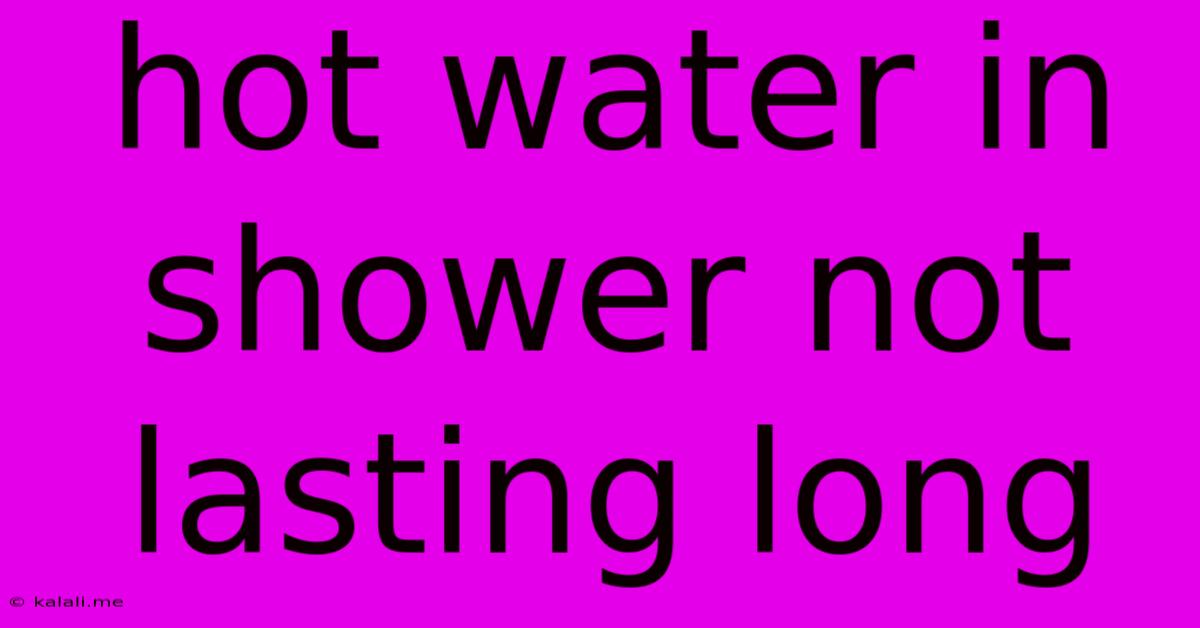Hot Water In Shower Not Lasting Long
Kalali
Jun 06, 2025 · 3 min read

Table of Contents
Hot Water in Shower Not Lasting Long? Here's How to Fix It!
Are you tired of your blissful hot shower turning into an icy shock? A short-lived hot water supply is frustrating, but thankfully, often solvable. This article explores the common culprits behind dwindling hot water in your shower and provides practical solutions to get you back to enjoying long, luxurious hot showers. We'll cover everything from simple checks to more involved repairs, empowering you to diagnose and fix the problem yourself, saving time and money.
Understanding Your Hot Water System
Before diving into troubleshooting, understanding your hot water system is crucial. Most homes use either a tank-style water heater or a tankless (on-demand) water heater. Knowing which type you have will significantly narrow down the potential problems.
- Tank Water Heaters: These store a set amount of heated water in a tank. Issues often stem from insufficient tank size, sediment buildup, or malfunctioning components.
- Tankless Water Heaters: These heat water on demand. Problems are frequently linked to insufficient gas or electric supply, scale buildup, or faulty internal components.
Common Causes of Short Hot Showers
Let's explore the most frequent reasons why your hot water runs out quickly:
1. Low Water Heater Temperature: This is the simplest fix. Check your water heater's temperature setting. It should be between 120-140°F (49-60°C) for optimal hot water and safety. A lower setting means less hot water available. Adjust the temperature dial accordingly (consult your water heater's manual).
2. Sediment Buildup (Tank Water Heaters): Over time, sediment accumulates at the bottom of your tank, reducing its effective capacity. This sediment acts as insulation, preventing efficient heating. Flushing your tank regularly can significantly improve hot water longevity. This involves draining a portion of the water from the tank to remove sediment. Look for tutorials specific to your water heater model online for safe and effective flushing procedures.
3. Faulty Heating Element or Gas Burner (Tank Water Heaters): A malfunctioning heating element (electric) or gas burner can fail to adequately heat the water. This requires professional assessment and likely replacement of the faulty component. Listen for unusual noises from your water heater—clicking, banging, or popping sounds could indicate a problem.
4. Insufficient Gas Supply (Tankless Water Heaters): Tankless water heaters rely on a steady gas supply. If the gas supply is low, the unit won't generate enough hot water. Check your gas meter and ensure the gas line to the water heater is unobstructed.
5. Low Water Pressure: Low water pressure throughout your home, not just in the shower, can result in reduced hot water flow. This might point to a problem with your main water supply line or a clogged pipe. Contact a plumber to investigate.
6. Leaking Pipes: A leak in your hot water pipes will significantly reduce the amount of hot water reaching your shower. Check your pipes for signs of leaks – dampness, water stains, or dripping. Repairing leaks should be a priority to avoid further water damage.
7. Multiple Hot Water Fixtures Running Simultaneously: Using other hot water appliances (dishwasher, washing machine) while showering will deplete the hot water supply faster, particularly for tank-style heaters. Try to avoid running other hot water appliances concurrently.
8. Old or Inefficient Water Heater: If your water heater is very old, it may simply be nearing the end of its lifespan and not heating water as efficiently as it once did. Replacing the water heater might be the most cost-effective solution in the long run.
When to Call a Professional
While many issues can be addressed independently, it's crucial to know when to call a qualified plumber:
- Unusual noises from the water heater.
- Gas leaks.
- Significant water leaks.
- Difficulty flushing the water heater (tank-style).
- Suspected problems with the electrical components (electric water heater).
Addressing your short hot shower problem quickly can save you frustration and potential water damage. By following these steps and understanding the root cause, you can regain the enjoyment of long, satisfying hot showers. Remember safety first – consult a professional when necessary.
Latest Posts
Latest Posts
-
What Can I Use At Home To Lubricate Bike
Jun 07, 2025
-
Main Water Shut Off Valve Leaking
Jun 07, 2025
-
Put All Links On A Screen
Jun 07, 2025
-
How Do I Cut Concrete Blocks
Jun 07, 2025
-
How To Properly Keep And Preserve A Printed Pdf Textboko
Jun 07, 2025
Related Post
Thank you for visiting our website which covers about Hot Water In Shower Not Lasting Long . We hope the information provided has been useful to you. Feel free to contact us if you have any questions or need further assistance. See you next time and don't miss to bookmark.